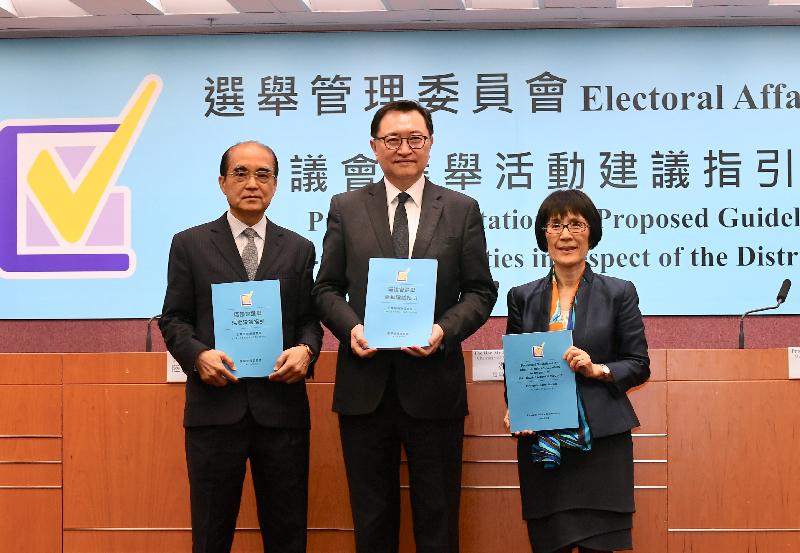Public consultation on District Council Election proposed guidelines commences (with photo/video)
The following is issued on behalf of the Electoral Affairs Commission:
The Electoral Affairs Commission today (June 11) released the proposed guidelines on election-related activities in respect of the District Council Election for public consultation. The consultation will last for 30 days until July 10.
"The 2019 District Council Ordinary Election will be held on November 24. Before each District Council ordinary election, the Commission will revise and update the guidelines for use at the coming ordinary election and the subsequent by-elections," the Commission Chairman, Mr Justice Barnabas Fung Wah, said at a press conference.
"The proposed guidelines have two aspects, namely, to explain in simple language the relevant legislative provisions and to promulgate a code of conduct in election-related activities based on the principle of fairness and equality, to ensure that the elections are conducted in an honest and fair manner," Mr Justice Fung said.
"The proposed guidelines are prepared on the basis of the existing guidelines for the District Council Election, with revisions to reflect the relevant legislative amendments and suitable updates in the light of experience in past elections. Certain parts of the guidelines are also further elaborated for better understanding of the principles."
The proposed guidelines set out the legal requirement for a registered elector to submit address proof upon an application for change of residential address and that the statutory deadline for electors to submit change of address has been advanced by one month, and stress that it is an offence to knowingly or recklessly give false or misleading information for voter registration.
The proposed guidelines update the reminders on issuing election advertisements, which include reminding persons or organisations publishing materials appealing to electors to vote for anyone capable of being reasonably understood by an elector as referring to a certain identified candidate or candidates to observe the legislative provisions relating to incurring election expenses on behalf of the candidates.
The proposed guidelines also reflect the legislative amendment that a person, other than a candidate and an authorised election expense agent, who publishes a message on the Internet capable of being an election advertisement will be exempted from the relevant criminal liability for incurring election expenses not in the capacity of a candidate or an election expense agent if the expenses incurred are only electricity and/or Internet access charges.
"Media organisations should treat all candidates in accordance with the principle of fair and equal treatment in producing and publishing election-related programmes and reports. In this context, the proposed guidelines set out the new definition for 'candidate', i.e. a person whose nomination form has been received by the Returning Officer, which is different from the definition under the Elections (Corrupt and Illegal Conduct) Ordinance. The list of such candidates will be published on the election website for the media and public reference," Mr Justice Fung said.
He added that when determining whether any programme or reporting by the media is in breach of the fair and equal treatment principle, the Commission may take into consideration the overall reporting by the media organisation during the election period (i.e. from the start of the nomination period up to the close of polling).
The proposed guidelines also stress that under the law, canvassing activities are prohibited in the entire building where a polling station is located as well as on the ground floor level of other buildings within the No Canvassing Zone, regardless of whether they are government or private premises, and even if approval has been obtained from the building management concerned.
Mr Justice Fung also reminded electors that the Registration and Electoral Office (REO) continues to implement checking measures in the current voter registration cycle and has issued inquiry letters to about 80 000 electors. Using other contact information provided by the electors under inquiry, the REO has also contacted them via telephone, mobile phone short message service, email or fax to remind them to respond as soon as possible. Electors under inquiry are urged to respond by July 2 so that their voter registration can be retained.
The proposed guidelines can be downloaded from the Commission website (www.eac.hk). They are also available for public inspection at the REO and the Public Enquiry Service Centres of District Offices.
Written representations can be submitted to the Commission's Secretariat by post at 10/F, Harbour Centre, 25 Harbour Road, Wan Chai, by fax (2511 1682) or by email (eacenq@.eac.hk) at the latest by July 10. Late submissions will not be considered.
To gather views on the proposed guidelines, the Commission will hold a public forum from 7pm to 9pm on June 25 (Tuesday) at Quarry Bay Community Hall, 1 Greig Road, Quarry Bay, Hong Kong.
For enquiries, please call 2891 1001.
